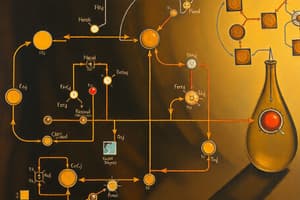Podcast
Questions and Answers
Which pathway is considered a pure anabolic pathway?
Which pathway is considered a pure anabolic pathway?
- Krebs cycle
- Gluconeogenesis (correct)
- Glycolysis
- Glycogenolysis
What is the total ATP yield from the complete oxidation of one molecule of glucose aerobically?
What is the total ATP yield from the complete oxidation of one molecule of glucose aerobically?
- 12 ATP
- 6 ATP
- 36-38 ATP (correct)
- 2 ATP
Which coenzyme is specifically required by the HMP shunt?
Which coenzyme is specifically required by the HMP shunt?
- NAD
- FAD
- CoA
- NADP (correct)
Which cycle occurs completely in the mitochondria?
Which cycle occurs completely in the mitochondria?
Which key enzyme is required for glycogenesis?
Which key enzyme is required for glycogenesis?
What type of bond does glycogen phosphorylase break?
What type of bond does glycogen phosphorylase break?
Which metabolic pathway does fructose 2,6-bisphosphate stimulate?
Which metabolic pathway does fructose 2,6-bisphosphate stimulate?
What condition is characterized by decreased renal tubular reabsorption of glucose?
What condition is characterized by decreased renal tubular reabsorption of glucose?
Which enzyme converts glucose to glucose-6-phosphate?
Which enzyme converts glucose to glucose-6-phosphate?
What is the normal renal threshold for glucose reabsorption?
What is the normal renal threshold for glucose reabsorption?
Flashcards
Anabolic pathway
Anabolic pathway
A metabolic pathway that builds complex molecules from simpler ones, requiring energy.
Catabolic pathway
Catabolic pathway
A metabolic pathway that breaks down complex molecules into simpler ones, releasing energy.
Amphibolic pathway
Amphibolic pathway
A metabolic pathway that can function both in anabolism and catabolism, depending on cellular needs.
Glycolysis
Glycolysis
Signup and view all the flashcards
Krebs Cycle
Krebs Cycle
Signup and view all the flashcards
Substrate-level phosphorylation
Substrate-level phosphorylation
Signup and view all the flashcards
Aerobic glycolysis
Aerobic glycolysis
Signup and view all the flashcards
Anaerobic glycolysis
Anaerobic glycolysis
Signup and view all the flashcards
Glycogenesis
Glycogenesis
Signup and view all the flashcards
Glycogenolysis
Glycogenolysis
Signup and view all the flashcards
Gluconeogenesis
Gluconeogenesis
Signup and view all the flashcards
HMP Shunt
HMP Shunt
Signup and view all the flashcards
Uronic Acid Pathway
Uronic Acid Pathway
Signup and view all the flashcards
Glucose-6-phosphatase
Glucose-6-phosphatase
Signup and view all the flashcards
Mitochondria
Mitochondria
Signup and view all the flashcards
Cytoplasm
Cytoplasm
Signup and view all the flashcards
Glycogen phosphorylase action
Glycogen phosphorylase action
Signup and view all the flashcards
Glycerol to glucose synthesis
Glycerol to glucose synthesis
Signup and view all the flashcards
Propionol to glucose synthesis
Propionol to glucose synthesis
Signup and view all the flashcards
Fructose 2,6-bisphosphate role
Fructose 2,6-bisphosphate role
Signup and view all the flashcards
Fanconi syndrome
Fanconi syndrome
Signup and view all the flashcards
Pyruvate to Acetyl CoA
Pyruvate to Acetyl CoA
Signup and view all the flashcards
RBC Glycolysis
RBC Glycolysis
Signup and view all the flashcards
Normal Fasting Blood Glucose
Normal Fasting Blood Glucose
Signup and view all the flashcards
Normal Renal Glucose Threshold
Normal Renal Glucose Threshold
Signup and view all the flashcards
Glucokinase/Hexokinase Action
Glucokinase/Hexokinase Action
Signup and view all the flashcards
Fructokinase Action
Fructokinase Action
Signup and view all the flashcards
Hexokinase action on Fructose
Hexokinase action on Fructose
Signup and view all the flashcards
Galactokinase action
Galactokinase action
Signup and view all the flashcards
Hexokinase action on Galactose
Hexokinase action on Galactose
Signup and view all the flashcards
Study Notes
Carbohydrate Metabolism Revision
- Anabolic Pathway: Glycogenesis, Gluconeogenesis
- Catabolic Pathway: Glycolysis, Oxidative decarboxylation, Krebs cycle, HMP shunt, Uronic acid pathway, Glycogenolysis
- Amphibolic Pathway: Krebs cycle
- Aerobic Glycolysis: 36-38 ATP from glucose
- Anaerobic Glycolysis: 2 ATP from glucose
- Oxidative Decarboxylation of Pyruvate: 6 ATP
- Acetyl CoA Oxidation (Krebs): 12 ATP
- Substrate-Level Phosphorylation (Glycolysis): Phosphoglycerate kinase and pyruvate kinase
- Substrate-Level Phosphorylation (Krebs Cycle): Succinate thiokinase
- Coenzymes:
- NADP (HMP shunt)
- NAD (Glyceraldehyde-3-phosphate dehydrogenase)
- FAD (Succinate dehydrogenase)
- Uronic Acid Pathway: Produces glucuronic acid (important for detoxification and vitamin C synthesis in animals)
- HMP Shunt: Produces NADPH+H and ribose-5-phosphate
- Key Glycolysis Enzymes: Hexokinase, Glucokinase, Phosphofructokinase 1, Pyruvate kinase
- Key Krebs Cycle Enzymes: Citrate synthase, Isocitrate synthase, α-ketoglutarate dehydrogenase
- Key HMP Shunt Enzyme: Glucose-6-phosphate dehydrogenase
- Key Glycogenesis Enzyme: Glycogen synthase
- Key Glycogenolysis Enzyme: Glycogen phosphorylase
- Key Gluconeogenesis Enzymes: Pyruvate carboxylase, Phosphoenolpyruvate carboxykinase, Fructose 1,6-biphosphatase, Glucose-6-phosphatase
- Glycogenesis Requirements: Glycogen synthase, UDP-glucose, Branching enzyme, Glycogen primer
- Glycogenolysis Requirements: Glycogen phosphorylase, Inorganic phosphate, Glucan transferase, Debranching enzyme
- Liver Glycogenolysis: Produces free glucose due to glucose-6-phosphatase
- Muscle Glycogenolysis: Does not produce free glucose due to lack of glucose-6-phosphatase
- Cytoplasmic Cycles: Glycolysis, Oxidative decarboxylation, HMP shunt, uronic acid pathway, glycogenesis, glycogenolysis
- Mitochondrial Cycle: Krebs cycle
- Gluconeogenesis Cycle: Both cytoplasmic and mitochondrial
- Glycerol to Glucose (Gluconeogenesis): Converted to dihydroxyacetone phosphate
- Propionyl CoA to Glucose (Gluconeogenesis): Converted to succinyl CoA
- Fructose 2,6-biphosphate: Stimulates glycolysis and inhibits gluconeogenesis
- Fanconi Syndrome: Impaired renal tubular reabsorption of glucose, amino acids, and phosphate
- Pyruvate to Acetyl CoA: Requires pyruvate dehydrogenase complex (with 5 coenzymes: NAD, FAD, CoASH, TPP, and Lipoic acid)
- α-ketoglutarate to Succinyl CoA: Requires α-ketoglutarate dehydrogenase complex (with same 5 coenzymes as pyruvate dehydrogenase)
- RBC Glycolysis: Anaerobic, produces lactate, yields 2 ATP, produces 2,3-bisphosphoglycerate
- Blood Glucose Levels: Fasting (70-110 mg/dL), 2-hour PP (up to 140 mg/dL), Hypoglycemia (<60 mg/dL), Normal renal threshold (180 mg/dL)
- Glucokinase and Hexokinase Action: Convert glucose to glucose-6-phosphate
- Fructokinase Action: Converts fructose to fructose-1-phosphate
- Hexokinase Action on Fructose: Converts fructose to fructose-6-phosphate
- Galactokinase Action: Converts galactose to galactose-1-phosphate
- Hexokinase Action on Galactose: Converts galactose to galactose-6-phosphate
Studying That Suits You
Use AI to generate personalized quizzes and flashcards to suit your learning preferences.




